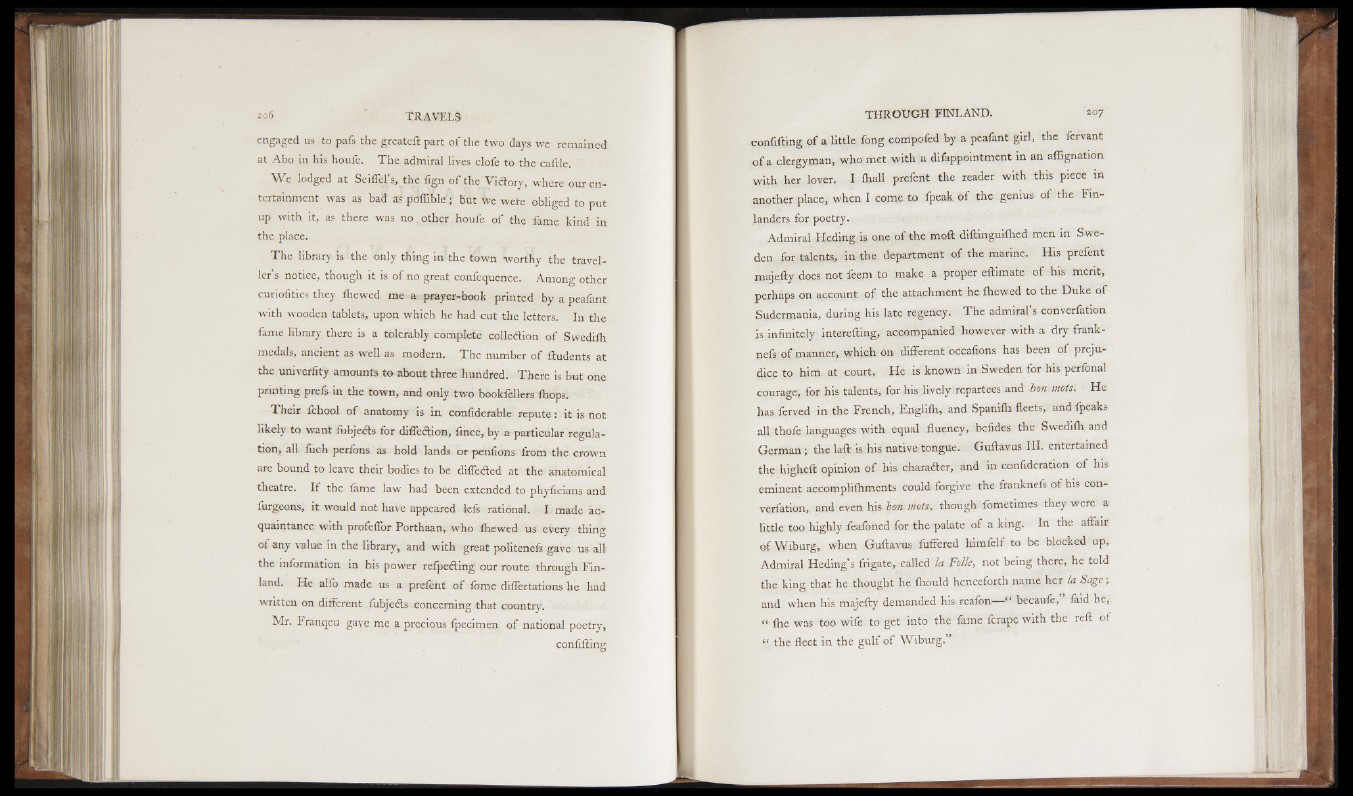
engaged us to pafs the grcateil part o f the two days we remained
at Abo in his houfe. The admiral lives clofe to the caftle.
W e lodged at Seiffel’s, the fign o f the Vidlory, where our entertainment
was as bad as jídifibleY but We were obliged to put
up with it, as there was no . other houfe o f the fame kind in
the place.
T he library is the only thing in the town worthy the traveller’s
notice, though it is o f no great confequence. Among other
curiofities they lhewed me a prayer-book printed by a peafant
with wooden tablets, upon which he had cut the letters. In the
fame library there is a tolerably complete colleaion o f Swedifh
medals, ancient as well as modern. The number o f Undents at
the univerfity amounts to shout three hundred. There is but one
printing prefs in the town, and only two bookfellers ihops.
Their léhool o f anatomy is in conliderable repute: it is not
likely to want fubjedts for diffection, fmcc, by a particular regulation,
all fueh perfons as hold lands or penfions from the crown
are bound to leave their bodies to be dilTcc'ted at the anatomical
theatre. I f the fame law had been extended to phyiicians and
furgeons, it would not have appeared lefs rational. I made acquaintance
with profeffor Porthaan, who fhewed us every thing
o f any value in the library, and with great politenefs gave us all
the information in his power refpecting our route through Finland.
He alfo made us a prefent o f fome differtations he had
written on different fuhjefts concerning that country.
Mr. Franqeu gave me a precious fpecimen o f national poetry,
confifting
confifting o f a little fong compofed by a peafant girl, the fervant
o f a clergyman, who met with a difappointment in an affignation
with her lover. I fhall prefent the reader with this piece in
another place, when I come to fpeak o f the genius o f the Finlanders
for poetry.
Admiral Heding is one o f the moft dininguiihed men in Sweden
for talents, in the department o f the marine. His prefent
majefty does not feem to make a proper eftimate o f his merit,
perhaps on account o f the attachment he fhewed to the Duke o f
Sudermania, during his late regency. T he admiral s converfation
is infinitely interefting, accompanied however with a dry frank-
nefs o f manner, which on different occafions has been o f prejudice
to him at court. He is known in Sweden for his perfonal
courage, for his talents, for his lively repartees and bon mots. He
has ferved in the French, Englifh, and Spanifh fleets, and fpeaks
all thofe languages with equal fluency, befides the Swedifh and
G erman; the laft is his native tongue. Guftavus III. entertained
the higheft opinion o f his character, and in confideration o f his
eminent accomplifhments could forgive the franknefs of his converfation,
and even his bon mats, though fometimes they were a
little too highly feafoned for the palate o f a king. In the affair
o f Wiburg, when Guftavus fuffered himfelf to be blocked up,
Admiral Heding’s frigate, called la Folle, not being there, he told
the king that he thought he fhould henceforth name her la Sage;
and when his majefty demanded his reafbn— “ becaufe, laid he,
“ fhe was too wife to get into the fame fcrape with the reft of
the fleet in the gu lf o f Wiburg.”-